Ian Melin-Jones
Voith OceanCoat: New roll cover for coater backing rolls provides cost savings and improved efficiency
With OceanCoat, Voith is adding a highly durable option to its portfolio of coater roll covers. The especially stable material needs regrinding less often than standard roll covers, which reduces shutdown and maintenance costs.
- Longer grinding intervals and reduced downtime
- Consistent conditions due to stable roughness
- Potential to significantly reduce mill costs
Blue instead of black: Voith's new OceanCoat stands out from standard roll covers through its color alone. The blue shade allows the operator to quickly identify any overheating, which commonly occurs at the edges. This enables appropriate steps to be taken promptly. Additionally, the blue cover material is easier to clean, which notably reduces the downtime after a break. Thanks to the high mechanical stability of the cover material, OceanCoat is also able to withstand loads caused by breaks or paper wraps better than standard covers.
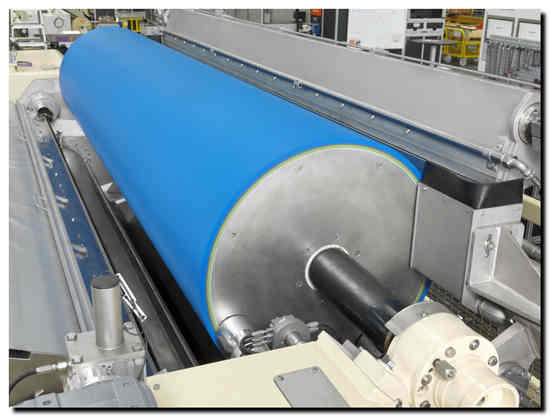 With OceanCoat, Voith is adding a highly durable option to its portfolio of coater roll covers that needs less regrinding and therefor reduces shutdown and maintenance costs.
With OceanCoat, Voith is adding a highly durable option to its portfolio of coater roll covers that needs less regrinding and therefor reduces shutdown and maintenance costs.
Other important benefits of the cover include the low degree of wear and reduced symptoms of aging. The desired roughness of the cover stays more constant over the operating life than a standard cover.
OceanCoat is designed to run dependably in a wide range of coater backing roll positions. More than a dozen OceanCoat covers are already operating successfully. Customers currently using the cover are placing additional orders, proving that they are very pleased with its performance. Users are highlighting the abrasion resistance, consistent roughness that results in stable operating conditions, and the fact that the cover is easy to clean after a break. Mills have realized significant cost savings through the use of OceanCoat.
About Voith Paper
Voith Paper is a Group Division of Voith and the leading partner and pioneer in the paper industry. Through constant innovations, Voith Paper is optimizing the paper manufacturing process, focusing on developing resource-conserving products to reduce the use of energy, water and fibers. Furthermore, Voith Paper offers a broad service portfolio for all sections of the paper manufacturing process.
About Voith
For 150 years, Voith’s technologies have been inspiring customers, business partners and employees worldwide. Founded in 1867, Voith today has around 19,000 employees, sales of €4.3 billion and locations in more than 60 countries worldwide and is thus one of the largest family-owned companies in Europe. Being a technology leader, Voith sets standards in the markets of energy, oil & gas, paper, raw materials and transport & automotive.
Environment and innovation, a winning combination: at Ecomondo 2017
Lucart illustrates, in its Sustainability Report, the results achieved and prospects for development
Reuse of raw materials, water conservation, energy efficiency and emission reduction: the Sustainability Report provides an overview of everything Lucart implemented in 2016
With seven production plants in Europe and more than 1,300 employees, Lucart's turnover exceeded €425 million in 2016.
Sustainability and innovation are the two mainstays of Lucart's activities, which have allowed it to achieve outstanding results, as illustrated by the 2016 Sustainability Report. Lucart is the first company in Italy to have launched a circular economy project in the tissue paper sector.
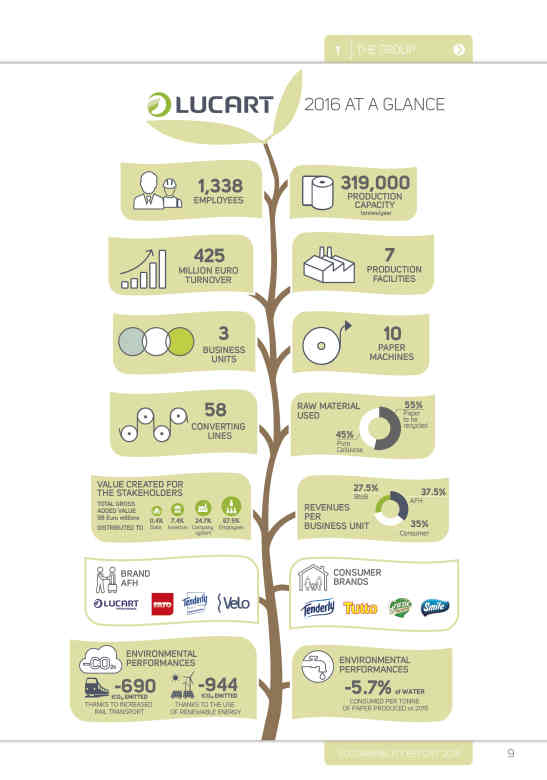
“I believe that we can be considered as a company that promotes a sustainable way of producing paper,” – Massimo Pasquini, Managing Director of Lucart, commented – “which is based on a systemic approach aimed at eliminating waste and reusing raw materials. To do this, we constantly strive to apply production and business models that are inspired by the circular economy and that are in line with EU environmental requirements. We are proud of the results we have achieved this year, since they are a successful example of our ongoing commitment to pursuing innovative and high-quality production” – Pasquini concluded – “We will continue to carry out all of our activities by placing people and the environment at the centre of our business strategy, leading the way towards a more sustainable future.”
Lucart has made positive progress towards the progressive elimination of waste and the reuse of raw materials, favouring the use of recovered materials (55% in 2016) over pure virgin cellulose (45%) for the production of its paper. The flagship of this sustainability strategy is the Natural project, a true example of the applicability of circular economy principles to the tissue sector.
The Natural project
This virtuous and award-winning project represents the evolution of paper, combining environmental sustainability and technological innovation. In partnership with Tetra Pak®, Lucart has developed an innovative technology that separates the cellulose fibres in beverage cartons from polyethylene and aluminium parts, without the use of substances that are harmful to humans or the environment. In this way, two new high-quality raw materials are produced. Fiberpack®, the paper used for the hygiene products in Lucart's Natural lines, is obtained from cellulose fibres. The company has also obtained a material called AL.PE.® from polyethylene and aluminium. This raw material is used to produce innovative systems for the dispensing of tissue products but also for pallets, mooring poles in Venice and floating platforms for wheelchair access and other commonly used items, which are all recycled and recyclable when they reach the end of their life cycle.
In just 4 years, from 2013 to 2016, the Natural project has produced great results:
- more than 2.8 billion 1-litre beverage cartons have been recycled, which, if lined up one after the other, would cover a distance equal to the circumvention of the Earth 16 times over
- more than 1.2 million trees have been saved thanks to this initiative, equal to a surface area of more than 4,200 football fields
- more than 73,000 tonnes of CO2 have been avoided, equal to the emissions produced by more than 578,000 Rome-Milan trips by car
The Natural project received an award on the occasion of the 14th edition of the “Sodalitas Social Award 2016”, namely, the “Best in Class” award, the most prestigious prize for corporate sustainability in Italy, and it also received the “Premio Non Sprecare” (Don’t Waste Award) in the “Companies” category in the same year thanks to its innovative and sustainable approach to circular economy and consumption. Lucart recently ranked second at the 6th edition of the European Paper Recycling Awards held in Brussels, for the Research & Development category, and received the EU Ecolabel Award 2017 for researching and developing new production and environmental solutions.
Water resources
Lucart has focused on using less raw materials and, in particular, on water resources by favouring water recycling, constantly monitoring the quality of wastewater as well as consumption in the various phases of the production process, and optimising consumption patterns. This resulted in a reduction in the specific water consumption for paper production with savings of -5.7% of water consumed per tonne of paper produced compared to 2015 and an overall reduction of 14% compared to 2014.
Logistics
With regard to logistics, Lucart has significantly reduced its impact on the environment in terms of emissions: 690 tonnes less CO2 thanks to increased rail transport, as part of the project “Sustainable Mobility: raw material transport with a shift from road to rail”, presented in 2015 and continued in 2016. The project, which mainly concerns the plant in Diecimo, in the province of Lucca, aims to use the existing railway network to significantly reduce the transport of raw materials and finished products by road.
Energy resources
In terms of energy resources, the company is constantly committed to making its production processes become increasingly efficient. Lucart was also one of the first paper manufacturing groups in Europe to focus on systems to self-generate electricity through cogeneration plants powered by methane gas.
Emissions into the atmosphere
As for its emissions into the atmosphere, Lucart has implemented a plan aimed at streamlining energy consumption by using energy from renewable sources, allowing for lower emissions per tonne of paper produced.
Lucart
Lucart, a leading company in Europe in the production of MG paper, tissue products (paper items for daily use such as toilet paper, kitchen paper, napkins, tablecloths, handkerchiefs etc.) and airlaid products, was founded in 1953 by the Pasquini Family. The company's production activities are distributed over 3 Business Units (Business to Business, Away from Home and Consumer) operating in the development and sales of products with brands such as Tenderly, Tutto, Grazie Natural and Smile (Consumer area), Lucart Professional, Tenderly Professional, Fato and Velo (Away from Home area). Lucart's production capacity exceeds 300,000 tonnes/year of paper on 10 continuous machines and 58 converting lines. Its consolidated turnover amounts to more than €400 million, with more than 1,300 employees in seven production plants (five in Italy, one in France and one in Hungary).
BillerudKorsnäs Launches SteriKraft® Protect AR – a new polymer reinforced medical paper
To answer the need for higher performance medical packaging systems, following the standardization regarding Packaging for terminally sterilized medical devices, BillerudKorsnäs has developed and now launches a new polymer reinforced paper SteriKraft® Protect AR.
The standardization, Packaging for terminally sterilized medical devices ISO 11607-1, 5.5 Storage & Transport, has led to more rigorous and realistic ship testing protocols which have, in turn, shown the need for higher performance medical device packaging systems. To answer this need, BillerudKorsnäs has developed a new polymer reinforced paper, SteriKraft® Protect AR.
SteriKraft® Protect AR is designed as a heat seal coating base but will also seal peel to selected advanced peelable films without needing a coating. More challenging applications such as large drape & gown packs, spinal needles, IV catheters etc. will benefit from the extra performance offered by SteriKraft® Protect AR. As with all other papers in the BillerudKorsnäs SteriKraft® range, Protect AR is fully approved under the relevant sections of EN868 and ISO 11607-1.
"The key benefit of the polymeric addition is to provide some stretch to the paper which results in much improved tensile energy absorption (TEA). TEA gives a good measure of the durability of the paper under shipping conditions," explains Jonathan Andrews, Business Development Director Medical at BillerudKorsnäs.
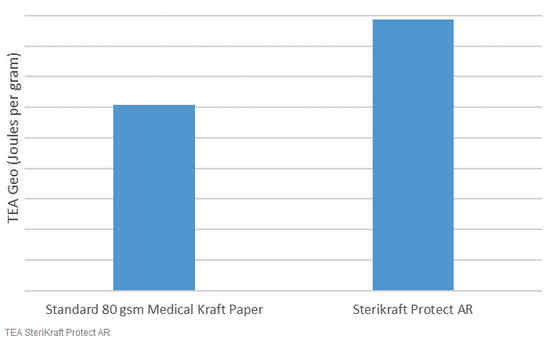
Comparison of Geometric TEA between standard medical kraft papers and new SteriKraft® Protect AR demonstrating the significantly higher performance of the new paper.
World launch at COMPAMED in Düsseldorf
The new BillerudKorsnäs SteriKraft® Protect AR will be displayed for the first time at Compamed tradefair “Hightech solutions for medical technology” 13-16 November in Düsseldorf, Germany. Visit our stand, Hall 8b G09, to find out more about Protect AR and the rest of BillerudKorsnäs' SteriKraft® range.
About BillerudKorsnäs SteriKraft®
BillerudKorsnäs SteriKraft is a medical paper that can withstand exposure to various sterilisation methods and guarantees the sterility and purity of the products right up until the moment of use. The packaging will maintain its sterility for five years and is offered for all major sterilisation methods. Strong, safe and with microbial barrier properties. For more information, visit www.billerudkorsnas.com/our-offer/packaging-materials/kraft-paper-medical
BillerudKorsnäs provides packaging materials and solutions that challenge conventional packaging for a sustainable future. We are a world-leading provider of primary fibre based packaging materials and have customers in over 100 countries. The company has 8 production sites in Sweden, Finland and the UK and about 4300 employees in over 13 countries. BillerudKorsnäs has an annual turnover of about SEK 22 billion and is listed on Nasdaq Stockholm. www.billerudkorsnas.com
Burgo supports Vancouver's declaration: together for a sustainable future
Companies that use natural resources have the duty to ensure the resources come from responsible sources. The Vancouver Declaration is a public promise, with which companies of all sizes and origins are committed to contributing to the implementation of the United Nations Sustainable Development Goals adopted in 2015, while underlining their commitment to a more sustainable forestry chain.
 The Declaration was presented during the 2017 FSC® (Forest Stewardship Council®) General Assembly in Vancouver, Canada, last October; in addition to Burgo, other companies signed in support of the initiative: IKEA, H & M, SIG, Marks & Spencer, Jysk, Mitsubishi Paper Mills and Fuji Xerox. The objective is to attract even more companies involved throughout the supply chain. Given the growing membership rate, this declaration, according to FSC, will have a positive impact on three key areas of sustainability: environmental, social, and economic. Obtaining collective enterprise support in the struggle to protect our forests and our planet is a fundamental step in combating climate change and ensuring the protection of ecosystems.
The Declaration was presented during the 2017 FSC® (Forest Stewardship Council®) General Assembly in Vancouver, Canada, last October; in addition to Burgo, other companies signed in support of the initiative: IKEA, H & M, SIG, Marks & Spencer, Jysk, Mitsubishi Paper Mills and Fuji Xerox. The objective is to attract even more companies involved throughout the supply chain. Given the growing membership rate, this declaration, according to FSC, will have a positive impact on three key areas of sustainability: environmental, social, and economic. Obtaining collective enterprise support in the struggle to protect our forests and our planet is a fundamental step in combating climate change and ensuring the protection of ecosystems.
From a social point of view, the role and importance of people in forestry cannot be underestimated; this is why the Vancouver Declaration strengthens the commitment so that all people living in the forest and its surrounding areas are involved in decisions that are of interest to "their" forests. The core of the FSC system is, in fact, the guarantee of the stakeholders’ commitment, democratic decision-making processes and the protection of forest workers.
Companies supporting the Declaration and the new FSC standards contribute concretely in ensuring forest workers worldwide receive a fair salary for the work they do and the protection of people who depend on forests for their sustenance.
Measures taken to protect the environment and people, protect the future of the industry itself.
This collective action and end-to-end collaboration is becoming increasingly strategic.
As Burgo, we signed the Vancouver Declaration because we are fully aware that forest resources are the essential component in paper production and that business continuity depends on long- term access to these raw materials. Without forestry products, we will not be able to serve our customers with products that meet their expectations: functionality, quality, availability, and sustainability. As a result, we recognize the responsibility we have in helping to ensure that forests are managed in a sustainable way and for quite some time now we’ve been actively committed to this undertaking by offering FSC-certified products. We have therefore taken this additional opportunity to offer visible and credible guarantees regarding our commitments to our customers and other stakeholders through shared and global action.
Burgo Group
Burgo Group is one of the leading European producers of coated and specialty paper. The Group is a complete 'system' developed around the world of paper: including production, distribution, paper recycling and processing of forestry products and also factoring and energy.
FSC (Forest Stewardship Council)
FSC is a non-governmental, independent and non-profit international organization, founded in 1993 to promote responsible management of forests and plantations. The FSC® brand identifies products containing wood from forests that are managed in a correct and responsible manner according to rigorous environmental, social and economic standards. The source forest has been independently checked and evaluated in accordance with these standards (principles and criteria of good forest management), established and approved by the Forest Stewardship Council® a.c. through the participation and consent of the parties involved.
For more information: burgogroup.com fsc.org
AkzoNobel completes $10 million sulfur derivatives investment in the US
AkzoNobel's Specialty Chemicals business has completed a $10 million investment at its LeMoyne sulfur derivatives plant in the US, which supplies essential ingredients used in several major industries.
Located in Alabama, the investment includes a 20,000 dry metric ton expansion for the production of sodium hydrosulfide (NaSH), which the company supplies to customers in the paper, leather tanning, mining and specialty polymers segments.
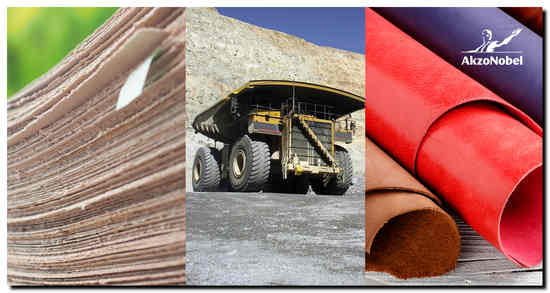
"This is a key expansion which will help to support growing customer demand," explains Sulfur Derivatives General Manager, Ignacio Garin. "The LeMoyne facility employs unique AkzoNobel technology which provides NaSH at lower impurity levels and higher concentrations than competing processes, providing a significant sustainability benefit for customers."
AkzoNobel is the only company to produce a high strength, high purity NaSH at 60% concentration, which means the product qualifies as an eco-premium solution, offering advantages in terms of energy efficiency, emissions and waste water.
Commenting on the expansion, Werner Fuhrmann, AkzoNobel's Executive Committee member responsible for Specialty Chemicals, adds: "This project is just the latest in a series of capital investments we have made to support the growth of our customers across a range of end-use markets. It also underlines our ongoing commitment to sustainability."
AkzoNobel creates everyday essentials to make people's lives more liveable and inspiring. As a leading global paints and coatings company and a major producer of specialty chemicals, we supply essential ingredients, essential protection and essential color to industries and consumers worldwide. Backed by a pioneering heritage, our innovative products and sustainable technologies are designed to meet the growing demands of our fast-changing planet, while making life easier. Headquartered in Amsterdam, the Netherlands, we have approximately 46,000 people in around 80 countries, while our portfolio includes well-known brands such as Dulux, Sikkens, International, Interpon and Eka. Consistently ranked as a leader in sustainability, we are dedicated to energizing cities and communities while creating a protected, colorful world where life is improved by what we do.
Unique program promoting the employment of young people organized by Valmet and the Children and Youth Foundation continues
The second part of the youth program started by Valmet and the Children and Youth Foundation in the spring has started today, November 15, at several of Valmet's units in Finland. As a part of the program Valmet enables paid practical training of three weeks for 100 young people. The participants to the unique program include young people aged 16-29 years who may, for instance, have challenges in finding their own path or with their basic working life skills.
 Ninety people applied for the fall program, and the 55 who were chosen started today in the following Valmet units: Espoo, Jyväskylä, Järvenpää, Raisio and Tampere. In the spring, young people also participated at the Tampere, Pori, Ulvila and Kajaani units.
Ninety people applied for the fall program, and the 55 who were chosen started today in the following Valmet units: Espoo, Jyväskylä, Järvenpää, Raisio and Tampere. In the spring, young people also participated at the Tampere, Pori, Ulvila and Kajaani units.
"We wanted to celebrate Valmet's 220-year industrial history and the centenary of Finland's independence in a truly valuable way. Promoting employment among young people is important for society and an investment in the future. I hope that other companies will follow our example and provide young people with paid practical training and opportunities to learn working life skills," says Pasi Laine, President and CEO of Valmet.
Mentors and partners play a significant role in supporting the young people
Valmet's program was planned and is executed in cooperation with the Children and Youth Foundation, Academic Work and WorkPilots. Valmet plans and offers paid training and mentors from Valmet for the young people. The Children and Youth Foundation is responsible for recruiting young people for the program and for coaching their mentors. Academic Work provides the participants with coaching in job seeking and study-related issues as part of the program. WorkPilots helps young people in finding paths for continuing their journey.
"Each of the participants gets a personal mentor from Valmet, responsible for creating a safe and inspiring environment for the trainees and providing meaningful assignments that help them practice their working life skills and build their self-confidence. I am glad that so many Valmeteers have been ready to help these young people and act as mentors," says Anu Salonsaari-Posti from Valmet's working group for the youth program.
Excellent experiences from the first part of the program
Those who participated in the program in the spring said that they received new self-confidence and courage. Especially important for them was to receive positive feedback, gain feelings of success and to be part of the work community. Working within a work community helped the young people meet new people and act in new situations. As their favorite job assignments, the young participants listed, among other things, preparing PowerPoint presentations, taking photos, filing documents and scanning.
"The practice opportunity in the spring provided many young people with important lessons for the future. The first experiences at work are very important. They will be used to build an image of one's own skills, interests and the future working life. Successful experiences strengthen the young people's self-esteem, provide courage and spur them to try things out. Valmet has worked hard to provide an opportunity for young people to get successful experiences and strengthen their working life skills in an encouraging environment. We are happy to participate in cooperation where the young people's path toward the working life is supported with consideration of their starting point," says Tuula Colliander, Executive Director of the Children and Youth Foundation.
"Academic Work supports and helps young people specifically at the beginning of their path in working life, so this cooperation program was fully in line with our values. In addition, meeting young people in various situations in life also provides a learning opportunity to our own personnel, and we are eagerly anticipating this stage of the project. More than 20 people from Academic Work will participate in mentoring the young trainees in different locations in Finland," says Laura Korpilauri from Academic Work.
Read more about Valmet's 220 years of industrial history: www.valmet.com/220years
Valmet is the leading global developer and supplier of process technologies, automation and services for the pulp, paper and energy industries. We aim to become the global champion in serving our customers.
Valmet's strong technology offering includes pulp mills, tissue, board and paper production lines, as well as power plants for bioenergy production. Our advanced services and automation solutions improve the reliability and performance of our customers' processes and enhance the effective utilization of raw materials and energy.
Valmet's net sales in 2016 were approximately EUR 2.9 billion. Our 12,000 professionals around the world work close to our customers and are committed to moving our customers' performance forward - every day. Valmet's head office is in Espoo, Finland and its shares are listed on the Nasdaq Helsinki.
Kemira increases prices of coagulant and polymer products in EMEA
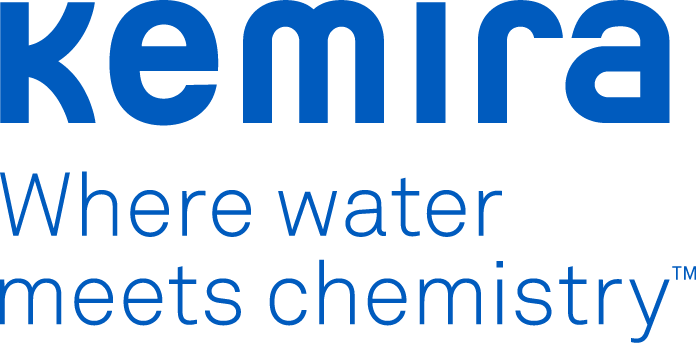 Kemira, a global chemicals company serving customers in water intensive industries, announces price increases across its coagulant and polymer product lines in the EMEA region.
Kemira, a global chemicals company serving customers in water intensive industries, announces price increases across its coagulant and polymer product lines in the EMEA region.
The price increases, which become effective on January 1st, 2018 or as contracts allow, are necessary due to overall significant and continued increases in costs of both freight and many key raw materials, where the supply-demand situation is challenging.
|
Coagulants: |
Polymers: |
|
11-13% for aluminum based coagulants 11-13% for iron sulphate based coagulants 5-7% for iron chloride based coagulants |
8% for dry products 9% for emulsions and other liquid polymers |
Increases can be higher for specific product types in locations that are most acutely impacted by increased costs.
For more information:
Wido Waelput
Senior Vice President, Commercial, Industry & Water EMEA
tel. +49 17 2884 3496
wido.waelput (a) kemira.com
Harri Eronen
Senior Vice President, Commercial, Pulp & Paper EMEA
tel. +49 17 1802 8790
harri.eronen (a) kemira.com
Kemira is a global chemicals company serving customers in water intensive industries. We provide expertise, application know-how and chemicals that improve our customers' product quality, process and resource efficiency. Our focus is on pulp & paper, oil & gas and water treatment. In 2016, Kemira had annual revenue of around EUR 2.4 billion and 4,800 employees. Kemira shares are listed on the Nasdaq Helsinki Ltd.
www.kemira.com
European paper industry takes over environmental footprint method from EU
The Confederation of European Paper Industries (CEPI) informed the European Commission on 13 November of its intention to take over the PEFCR (Product Environmental Footprint Category Rules) prepared under a larger EU pilot on environmental footprints.
 “The PEFCR project promised to deliver a clear, simplified and workable method for environmental footprinting that our value chain could effectively use and rely upon. After more than four year’s work, the European Commission body in charge of the project is far from this objective. CEPI will now take the necessary measures to conclude the project and design a tool that is meaningful for business and workable for SMEs,” says Sylvain Lhôte, Director General at CEPI.
“The PEFCR project promised to deliver a clear, simplified and workable method for environmental footprinting that our value chain could effectively use and rely upon. After more than four year’s work, the European Commission body in charge of the project is far from this objective. CEPI will now take the necessary measures to conclude the project and design a tool that is meaningful for business and workable for SMEs,” says Sylvain Lhôte, Director General at CEPI.
Initiated in 2013, the Intermediate Paper Pilot was meant to deliver a methodology for environmental footprinting of intermediate paper in a clear and workable format for all users. It was considered, at that time, that the workability of future PEF rules was imperative for the paper value chain, particularly SMEs. Led by the European Commission’s Joint Research Centre, however, the project has since been turned into an overly academic tool and the process continuously delayed.
The industry recognises the value of establishing a reference tool for communicating the environmental performance of paper products to customers and consumers. The industry has therefore decided to take back the lead from the European Commission and revise the PEFCR. In order to do so, CEPI has outlined a number of key steps in a letter sent to the Commission’s environment department here. The process would lead to developing free software for calculating the environmental footprint of intermediate paper, which could be extended by the printing and paper converting associations to a tool for final paper products. CEPI believes these steps are achievable over the 2018 – 2019 period.
CEPI is the pan-European association representing the forest fibre and paper industry. Through its 18 national associations CEPI gathers 495 companies operating more than 900 pulp and paper mills across Europe producing paper, pulp, cardboard, tissue and other bio-based products. CEPI represents 22% of world production, €81 billion of annual turnover to the European economy and directly employs over 175,000 people.
James Cropper strengthens leadership team with new appointment
British master papermaker James Cropper has bolstered its marketing function with the appointment of Richard Bracewell as its new marketing director.
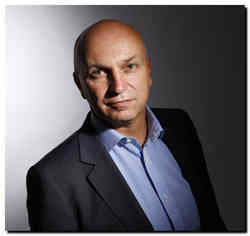 Richard brings a wealth of senior experience to the speciality paper manufacturer, having held a variety of marketing leadership positions at Shell International during a 20-year career.
Richard brings a wealth of senior experience to the speciality paper manufacturer, having held a variety of marketing leadership positions at Shell International during a 20-year career.
His roles at the energy company included developing and leading a global automotive servicing business, head of marketing for branded motor oils and head of global sponsorships.
The new appointment signals James Cropper’s commitment to delivering a market leading product and service offer. Richard will oversee the marketing strategy and will play a fundamental role in accelerating the team to meet its objective of continued, sustainable growth.
Commenting on his appointment, Richard said: “I join the business at an extremely exciting time as we increase our focus on developing new and innovative tailor-made products for our customers worldwide. I look forward to contributing to James Cropper’s continued success.”
His appointment follows the successful launch of CupCycling™ by James Cropper. The company now holds the technology to ‘upcycle’ used coffee cups and turn them into luxurious papers for packaging, creative design and print. This world-first for recycling will form a major part in an exciting portfolio of projects planned for 2018.
Steve Adams, managing director at James Cropper, said: “Bringing Richard on board comes as James Cropper moves into a new era and we’re confident that he brings with him the expertise required to carry out such a vital role. I look forward to working alongside him as we continue our brand journey.”
For more information about James Cropper, visit www.jamescropper.com
About James Cropper
James Cropper are prestige paper innovators based in the English Lake District, supplying distinct, custom-made paper products to many of the world’s leading luxury brands, art galleries and designers. Celebrating 170 years of high quality paper production in 2015, the business has been carefully stewarded and nurtured by six generations of the Cropper family and is renowned globally for individual expertise in colour, dedicated responses to the most challenging custom projects and award-winning commitment to the highest standards of sustainability.
A network of global sales and production facilities from Europe to the Far East provides local customer service to international clients, while its historic base in the village of Burneside retains nearly two centuries worth of papermaking expertise.
About Technical Fibre Products (TFP)
As well as paper products, James Cropper plc also incorporates Technical Fibre Products (TFP), manufacturers of non-woven materials from carbon, glass and polymer fibres, which play a key part in production of composites in the automotive, energy and aerospace sectors.
About James Cropper 3D Products
With James Cropper 3D Products, James Cropper plc has created the next generation of sustainable moulded paper packaging. Available in a wide variety of colours and with a naturally tactile finish, the product has a clear focus on quality and is design-engineered to suit all packaging needs. Features to improve product value and packaging integrity, such as personal embossing, natural hinges and cut-outs, enhance brand impact. All packaging products are recyclable and made from 100 per cent renewable natural fibres.
For further information visit: www.jamescropper.com, www.jc3dp.com and www.tfpglobal.com
ANDRITZ to supply baling line with bale tracking to Sappi Saiccor
International technology Group ANDRITZ has received an order from Sappi Saiccor to supply a baling line with bale tracking for its mill in Saiccor, South Africa. Start-up is scheduled for 2018.
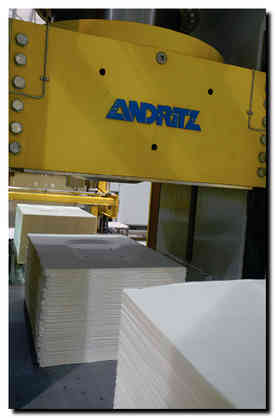 The ANDRITZ baling line has a capacity of 250 bales per hour. © ANDRITZThe order comprises a new baling line with a capacity of 250 bales per hour, machines to connect two existing production lines, and bale tracking for the new and the two existing baling lines. Although there is limited space available, no new building is necessary due to the special space-saving design of the ANDRITZ baling line.
The ANDRITZ baling line has a capacity of 250 bales per hour. © ANDRITZThe order comprises a new baling line with a capacity of 250 bales per hour, machines to connect two existing production lines, and bale tracking for the new and the two existing baling lines. Although there is limited space available, no new building is necessary due to the special space-saving design of the ANDRITZ baling line.
This order once again endorses the excellent cooperation between Sappi Saiccor and ANDRITZ. Only recently, ANDRITZ was awarded an order to supply a new headbox and rebuild the pulp dryer to increase the capacity at the Saiccor mill.
Situated 50 km south of the port of Durban in the province of KwaZulu-Natal, South Africa, the Saiccor mill is one of the production facilities for Sappi Specialized Cellulose. The mill has the capacity to produce approximately 800,000 tons of elemental chlorine free (ECF) dissolving wood pulp (DWP) per annum, mostly for the export market. With the Saiccor mill, the Ngodwana Mill (also in South Africa), and the Cloquet Mill (North America), Sappi Specialized Cellulose is the world’s largest manufacturer of DWP.
ANDRITZ is a globally leading supplier of plants, equipment, and services for hydropower stations, the pulp and paper industry, the metalworking and steel industries, and for solid/liquid separation in the municipal and industrial sectors as well as for animal feed and biomass pelleting. Other important business segments include automation and service business. In addition, the international Group is also active in the power generating sector (steam boiler plants, biomass boilers, recovery boilers, and gasification plants) and in environmental technology (flue gas cleaning plants) and offers equipment for the production of nonwovens, dissolving pulp, and panelboard as well as recycling plants. The publicly listed technology Group is headquartered in Graz, Austria, and has a staff of approximately 25,700 employees. ANDRITZ operates more than 250 sites in over 40 countries.
ANDRITZ PULP & PAPER is a leading global supplier of complete plants, systems, equipment, and comprehensive services for the production and processing of all types of pulp, paper, tissue, and cardboard. The technologies cover the processing of logs, annual fibers, and waste paper; the production of chemical pulp, mechanical pulp, and recycled fibers; the recovery and reuse of chemicals; the preparation of paper machine furnish; the production of paper, tissue, and cardboard; the calendering and coating of paper; as well as the treatment of reject materials and sludge. The service offering includes system and machine modernization, rebuilds, spare and wear parts, on-site and workshop services, optimization of process performance, maintenance and automation solutions, as well as machine relocation and second-hand equipment. Biomass, steam, and recovery boilers, as well as gasification plants for power generation, flue gas cleaning plants, plants for the production of nonwovens, dissolving pulp, and panelboard (MDF), as well as recycling plants are also part of this business area.
